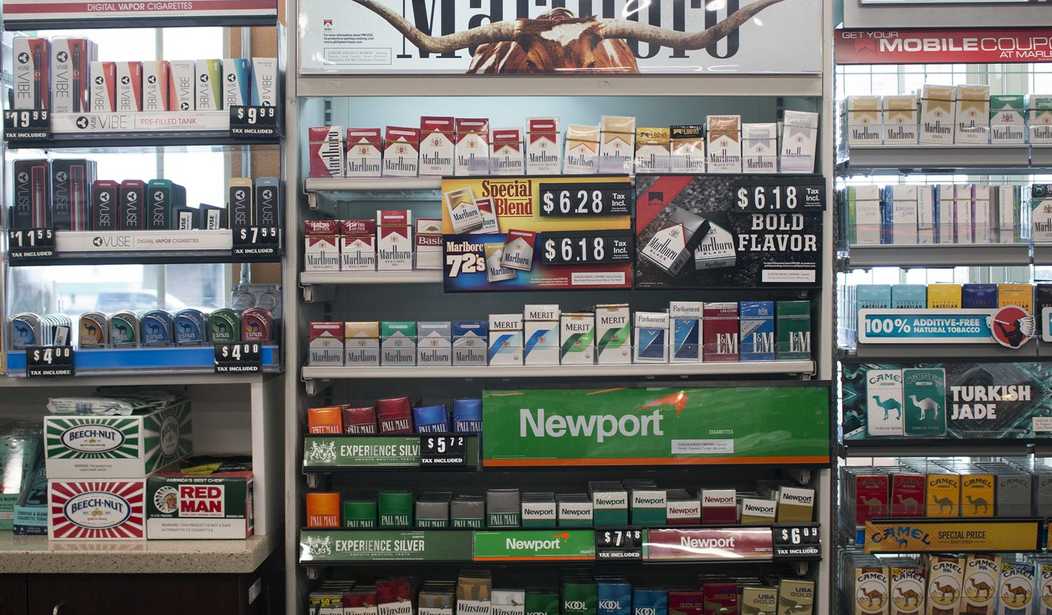To justify the draconian ban on flavored tobacco and vapor products, researchers at the American Cancer Society (ACS) have published a research letter in The Journal of the American Medical Association (JAMA), which examined the effects of the 2020 Massachusetts flavor ban.
The researchers compared cigarette sales in the Bay State to sales in other states and found that menthol cigarette sales in Massachusetts decreased by more than 327 percent compared to the “comparison states,” but nonflavored cigarette sales increased by more than 120 percent. When accounting for adjusting all cigarette sales (both menthol and nonflavored), cigarette sales in Massachusetts decreased by 282.3 percent.
What’s interesting is that the authors of the study don’t include all of Massachusetts’ neighboring states in their analysis. Of the 33 states in the comparison set, only one – Connecticut – is included. That inclusion, plus the notable absence of New Hampshire and Rhode Island, are suspect and in this latest round of anti-tobacco rhetoric from organizations propped up by Michael Bloomberg, so it’s best to take this so-called study with a grain of salt.
Regarding the one neighbor state inclusion, it’s worthy to note that Connecticut has a higher cigarette tax rate than Massachusetts. At $4.35-per-pack, smokers in the Constitution State are paying 24 percent more than those in the Bay State, which are subject to a $3.51 state excise tax. While it would be safe to assume that most smokers wouldn’t flock to that state, cigarette stamps have actually increased after Massachusetts’ flavor ban. According to the Connecticut Department of Revenue Services, the state collected $30.3 million in cigarette tax stamps in June 2021, a 2 percent increase from June 2020’s $29.7 million.
Recommended
Other states with more favorable sin taxes have greatly benefited from Massachusetts’ flavor ban, yet the ACS study completely ignores this.
According to the New Hampshire Department of Administrative Services, the Granite State collected $251 million in FY 2021, an 18.1 percent increase from FY 2020’s $212.5 million. Further, actual tobacco revenue in FY 2021 was 24.8 percent higher than 2020 estimates of $201.2 million. The ACS study does not take these figures into consideration – or the fact that New Hampshire’s excise cigarette tax of $1.78 is 49 percent lower than Massachusetts’ rate.
A 2020 analysis from the Tax Foundation found that “Massachusetts’ flavor ban has not limited use, just changed where Bay Staters purchase cigarettes and noted that sales in of cigarettes in New Hampshire and Rhode Island “skyrocketed” between June 2019 and June 2020.
Despite increasing cigarette tax revenue, smoking rates continue to decline in the aforementioned states. According to data from the Centers for Disease Control and Prevention, in 2020, only 13.9 percent of New Hampshire adults were smokers – a 12.6 percent decrease from 2019’s rate of 15.9 percent. In Massachusetts, rates decreased by only 8.3 percent, from 12.1 percent in 2019 to 11.1 percent in 2020.
Moreover, the study offers no guidance for policymakers dealing with black market products in the aftermath of a ban. While Massachusetts’ Illegal Tobacco Task Force was created in 2015, the flavor ban has required the General Assembly to increase budget funding to the task force, despite the ban causing a decrease in tobacco and vape tax revenue. And due to the ban, there is a lucrative market for flavored tobacco products. Between March and June 2021, agents in the tax force “uncovered 10 ‘high-level’ private sales … of flavored and menthol cigarettes and nicotine vapes.”
Lawmakers in the Bay State have noticed the reduced tax revenue and litany of problems posed by the ban and have introduced legislation to repeal the menthol cigarette ban. Another introduced bill would recognize modified risk tobacco products. Such products are recognized by the U.S. Food and Drug Administration (FDA) of reduced risk and the FDA authorizes companies to market those products. To date, 14 tobacco products have received modified risk marketing orders.
Lawmakers shouldn’t be blinded by so-called studies that purport to say that menthol bans are working. The authors of the latest round of anti-tobacco rhetoric fail to acknowledge the true failures of Massachusetts’ flavor ban. Lawmakers in both the Bay State and others that may seek to ban menthol cigarettes this year ought to be presented with all sides of facts to the issue, not cherry-picked research by groups that got millions of dollars from Bloomberg.
Lindsey Stroud is Director of The Taxpayers Protection Alliance’s Consumer Center.

























Join the conversation as a VIP Member